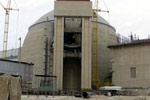 Wall Street Journal: European Union foreign ministers set the seal Monday on tough new sanctions aimed at Iran’s suspected nuclear-weapons program—but at the same time unexpectedly lifted curbs restricting supplies to a nuclear-power plant Russian engineers are building in the country.
Wall Street Journal: European Union foreign ministers set the seal Monday on tough new sanctions aimed at Iran’s suspected nuclear-weapons program—but at the same time unexpectedly lifted curbs restricting supplies to a nuclear-power plant Russian engineers are building in the country.
The Wall Street Journal
By DAVID CRAWFORD And STEPHEN FIDLER
 European Union foreign ministers set the seal Monday on tough new sanctions aimed at Iran’s suspected nuclear-weapons program—but at the same time unexpectedly lifted curbs restricting supplies to a nuclear-power plant Russian engineers are building in the country.
European Union foreign ministers set the seal Monday on tough new sanctions aimed at Iran’s suspected nuclear-weapons program—but at the same time unexpectedly lifted curbs restricting supplies to a nuclear-power plant Russian engineers are building in the country.
The new European sanctions target Iran’s trade, financial services, energy and transport sectors, according to a review of the document agreed on by the ministers.
Among other things, they extend travel bans and asset freezes, stop new medium- and long-term trade finance, bar the provision of insurance services, end cargo-only flights, and prohibit the supply of equipment and technology for the oil and natural-gas industries.
While the measures take aim directly at Iran’s missile programs and aspects of its nuclear program, they also contain an apparent contradiction: an explicit reversal of a bar introduced in 2007 on supplies to a light-water reactor at the Iranian coastal town of Bushehr.
The Bushehr exemption follows strong lobbying from Moscow, which insisted that EU sanctions shouldn’t impair delivery of equipment to the lucrative reactor project. Russia says it will complete construction of the billion-dollar plant next month.
European officials familiar with the Iran-sanctions discussion said the provision to legalize shipments to the Bushehr plant was necessary to ensure Russian co-operation with the international effort to increase pressure on Iran over its nuclear program, which Tehran says is for peaceful purposes.
Russian agreement was required to secure a resolution at the United Nations Security Council last month that tightened international sanctions on Iran.
William Hague, Britain’s foreign secretary, said the EU sanctions— which go beyond those agreed to at the U.N.—sent a clear message to Tehran that the longer it refused to come clean about its nuclear ambitions “the greater the pressure and isolation Iran will bring upon itself.”
In a joint statement, U.S. Secretary of State Hillary Clinton and Treasury Secretary Timothy Geithner welcomed the EU measures, along with sanctions implemented by Canada. They said the U.S. remained committed to a diplomatic solution with Tehran.
However, Shahin Gobadi of the National Council of Resistance of Iran, an exile group, said the Bushehr concession “was just the type of loophole that we have been complaining about. It gives too much discretion to people in the ports and in customs to decide themselves” what’s legal and what’s not. It also allows sensitive materials to be diverted from one project to another, he said.
Russia began building the Bushehr plant prior to the imposition of U.N. Security Council sanctions against Iran in late 2006. A series of U.N. Security Council resolutions imposing sanctions on Iran specifically exclude light-water reactors. A European official said Monday’s decision aligned the EU’s position with that of the U.N. but noted the exemption applies only to “light-water reactors begun before December 2006″—in other words, only to Bushehr.
In November 2009 and January 2010, German customs inspectors seized Russian cargo bound for Iran, citing violations of German and EU law that prohibits shipments of nuclear technology to Iran via the EU. Russian diplomats complained about the German investigation in talks with its five partners, according to three diplomats familiar with the discussion.
“Russia’s concerns were heard,” one diplomat said.
Britain, France and Germany lobbied for the concession to Russia, diplomats said. In September the three EU nations plan to renew their discussions with Russia, China and the U.S. on how to nudge Iran into serious negotiations aimed at resolving questions about its nuclear program.
If the talks with Iran remain at a stalemate, discussions on a new round of U.N. Security Council sanctions could begin by the end of the year, diplomats said.
Mr. Gobadi said the new EU sanctions are helpful but not sufficient to curtail Iran’s nuclear program. Tehran “is working around the clock on ways to evade sanctions,” he said.
The NCRI’s military wing, the Mujahedin e-Khalq, is considered a terrorist organization by the U.S., though a federal appeals court earlier this month ordered the State Department to re-evaluate the designation.
A spokesman for the Russian Foreign Ministry declined to comment on the EU decision. But he noted that Moscow has been striving since the last U.N. sanctions resolution to ensure that international restrictions don’t affect Russia’s deals with Tehran, in particular the Bushehr reactor.
Despite those efforts, the Kremlin’s hardening rhetoric about Iran’s nuclear ambitions seems to have alienated the government in Tehran, with President Mahmoud Ahmadinejad denouncing his Russian counterpart over the weekend as the “mouthpiece” of Iran’s enemies.
—Charles Forelle and Greg White contributed to this article.


